

Planetary ball mill RM 400 - the solution for nano-milling and mechanochemical studies
The PM 400 is a robust floor model with 4 grinding stations and accepts grinding jars with a nominal volume from 12 ml to 500 ml. It processes up to 8 samples simultaneously which results in a high sample throughput.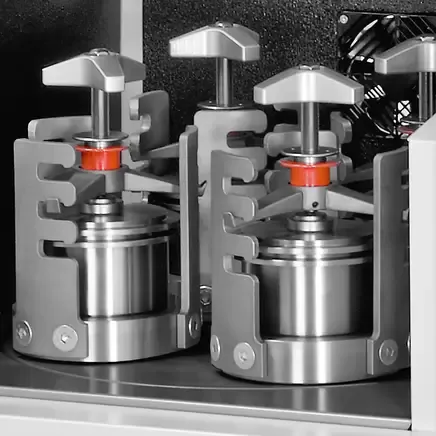
THE HIGH-VOLUME BALL MILL FOR HIGH THROUGHPUT APPLICATIONS
- Max. speed 400 rpm, large sun wheel
- Up to 10 mm feed size and 0.1 µm final fineness
- 4 grinding stations for jars from 12 ml up to 500 ml, jars of 12 – 80 ml can be stacked (two jars each)
- GrindControl to measure temperature and pressure inside the jar.
- Aeriation lids to control the atmosphere inside the jar
- Floor model, storable SOPs and cycle programs, 5 different jar materials for dry and wet grinding
FAST & POWERFUL
- Loss-free size reduction down to the submicron range
- Wet grinding yields particle sizes in the nanometer range (<100 nm)
- Variable speed from 30 to 400 rpm,
- speed ratio 1:-2 | 1:-2.5 | 1:-3
- Batch-wise processing with max. 4 x 220 ml
- 8 x 20 ml sample per batch with stacked jars
- Wide range of materials for contamination free grinding
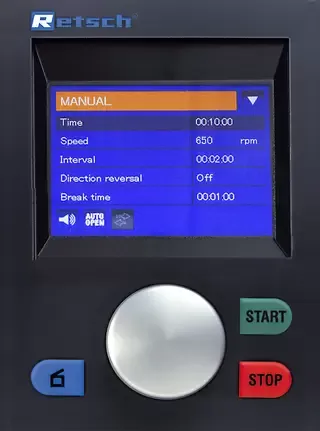
REPRODUCIBILITY, SAFETY AND EASY HANDLING
- Reproducible results due to speed control
- Easy and safe clamping of grinding jars
- The Safety Slider prevents starting the machine without securely clamped jars
- Innovative counterweight and imbalance sensor for unsupervised operation
- Comfortable parameter setting via display and ergonomic 1-button operation
- Automatic grinding chamber ventilation
- 10 SOPs can be stored, programmable starting time
- Power failure backup ensures storage of remaining processing time
SETTINGS & OPTIONS
- Dry and wet grinding possible
- Suitable for long-term trials, 99 h max.
- Interval operation allows for cooling breaks
- Direction reversal helps to minimize caking effects
WET AND NANO-SCALE GRINDING WITH THE PM 400
Wet grinding is used to obtain particle sizes below 5 µm, as small particles tend to get charged on their surfaces and agglomerate, which makes further grinding in dry mode difficult. By adding a liquid or dispersant the particles can be kept separated.
The graphic shows the result of grinding glass at 360 rpm in the PM 400. After 1 h of pulverization in ethanol with 1 mm grinding balls, the D90 value of the original sample was reduced from 13 µm to 1.6 µm.
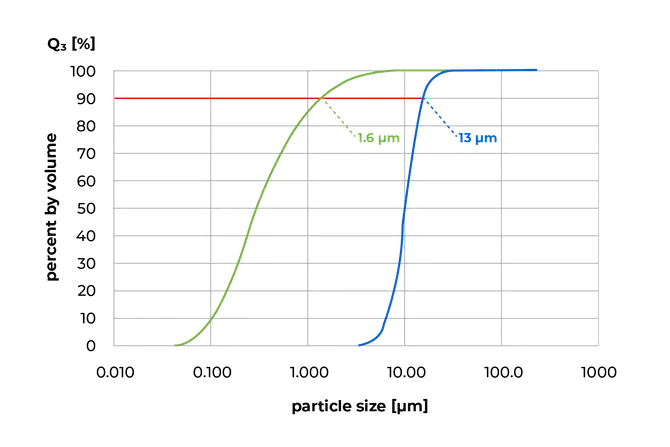
Grinding of glass in ethanol with 1 mm grinding balls.
Blue curve: original sample; green curve: pulverized sample after 60 min.
PM 400 MA FOR MECHANOCHEMICAL APPLICATIONS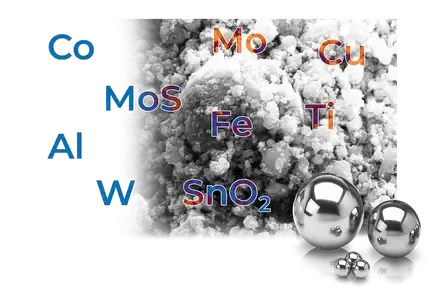
RETSCH Planetary Ball Mills are perfectly suited for processes like mechanical alloying or mechanosynthesis. For most reactions, the 1:-2 speed ratio of jar to sun wheel of the models PM 100 and PM 200 is fully adequate, as the ball charge produces enough impact energy. However, greater energy is required for some reactions. Here the PM 400 MA can be used with the increased speed ratio of 1:-2.5 or 1:-3.
The PM 400 MA with an increased speed ratio of 1:-2.5 or 1:-3.0 is designed specifically for these applications. The optimum speed ratio and all other grinding parameters need be determined by trial and error for a specific product.
TYPICAL SAMPLE MATERIALS
RETSCH planetary ball mills are perfectly suitable for size reduction of, for example, alloys, bentonite, bones, carbon fibres, catalysts, cellulose, cement clinker, ceramics, charcoal, chemical products, clay minerals, coal, coke, compost, concrete, electronic scrap, fibres, glass, gypsum, hair, hydroxyapatite, iron ore, kaolin, limestone, metal oxides, minerals, ores, paints and lacquers, paper, pigments, plant materials, polymers, quartz, seeds, semi-precious stones, sewage sludge, slag, soils, tissue, tobacco, waste samples, wood, etc.
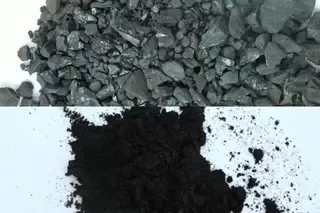
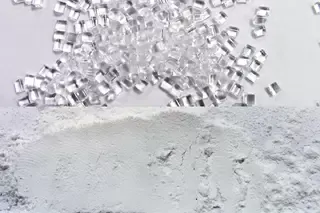
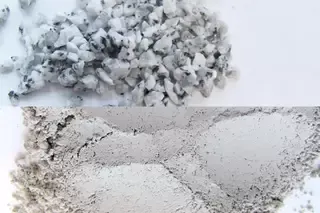
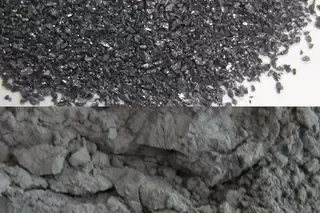
| Medium-hard, brittle: coal
4 x 150 g sample 500 ml stainless steel grinding jar 25 x 20 mm stainless steel grinding balls 2 min at 350 rpm | Medium-hard, tough: PMMA
4 x 130 g sample 500 ml zirconium oxide grinding jar 15 x 25 mm zirconium oxide grinding balls 30 min pre-grinding at 400 rpm 150 x 10 mm zirconium oxide grinding balls 16 h fine-grinding at 300 rpm | Hard-brittle: granite
4 x 80 g sample 250 ml agate grinding jar 6 x 30 mm agate grinding balls 15 min at 400 rpm | Hard: silicon carbide
|
TECHNICAL DATA
| Applications | pulverizing, mixing, homogenizing, colloidal milling, mechanical alloying, mechanosynthesis, nano grinding |
| Field of application | agriculture, biology, chemistry, construction materials, engineering / electronics, environment / recycling, geology / metallurgy, glass / ceramics, medicine / pharmaceuticals |
| Feed material | soft, hard, brittle, fibrous - dry or wet |
| Size reduction principle | impact, friction |
| Material feed size* | < 10 mm |
| Final fineness* | < 1 µm, for colloidal grinding < 0.1 µm |
| Batch size / feed quantity* | max. 4 x 220 ml, max. 8 x 20ml with stacked grinding jars |
| No. of grinding stations | 4 / 2 |
| Speed ratio | 1:-2 / 1:-2.5 / 1:-3 |
| Sun wheel speed | 30 - 400 min-1 |
| Effective sun wheel diameter | 300 mm |
| G-force | 26.8 g |
| Type of grinding jars | EasyFit, optional areation covers, safety closure devices |
| Material of grinding tools | hardened steel, stainless steel, tungsten carbide, agate, sintered aluminum oxide, silicon nitride, zirconium oxide |
| Grinding jar sizes | 12 ml / 25 ml / 50 ml / 80 ml / 125 ml / 250 ml / 500 ml |
| Stackable grinding jars | 12 ml / 25 ml / 50 ml / 80 ml |
| Setting of grinding time | digital, 00:00:01 to 99:59:59 |
| Interval operation | yes, with direction reversal |
| Interval time | 00:00:01 to 99:59:59 |
| Pause time | 00:00:01 to 99:59:59 |
| Storable SOPs | 10 |
| Measurement of input energy possible | yes |
| Interface | RS 232 / RS 485 |
| Drive | 3-phase asynchronous motor with frequency converter |
| Drive power | 1.5 kW |
| Electrical supply data | different voltages |
| Power connection | 1-phase |
| Protection code | IP 30 |
| Power consumption | ~ 2100 W (VA) |
| W x H x D closed | 836 x 1220 (1900) x 780 mm |
| Net weight | ~ 290 kg |
| Standards | CE |
| Patent / Utility patent | SafetySlider (DE 202008008473) |
